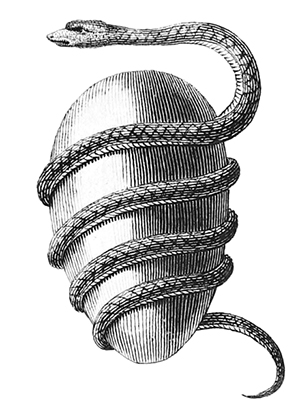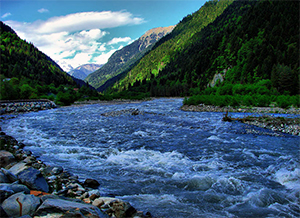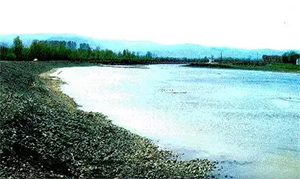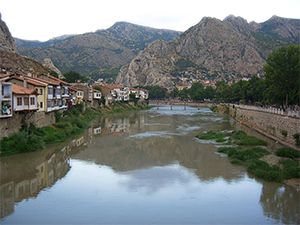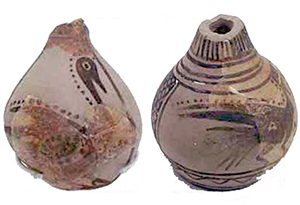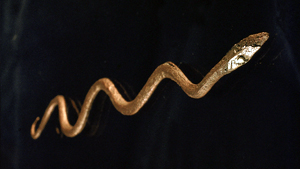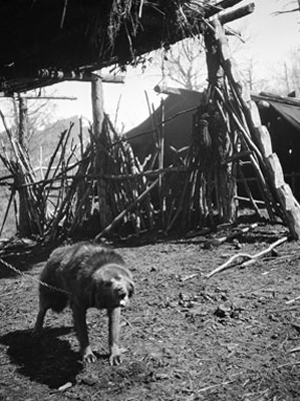Volume III, Page 95-126
Of the Original Chaldaic History, as Transmitted by Abydenus, Apollodorus, and Alexander Polyhistor, From Berosus of Babylonia.
I cannot proceed without taking notice of some extracts of Babylonish history, which time has happily spared us. From what has been already said, it is evident, that the history of nations must commence from the aera of Babylon: as here the first kingdom was founded; and here was the great scene of action among the firstborn of the sons of men. The history therefore of the Babylonians and Chaldeans should be the first in order to be considered. Not that I purpose to engage in a full account of this people; but intend only to consider those extracts, of which I have made mention above. The memorials are very curious; but have been greatly mistaken, and misapplied. The person, to whom we are beholden for them, was Berosus, a priest of Belus. He was a native of Babylonia; and lived in the time of Alexander, the son of Philip. The Grecians held him in great esteem: and he is particularly quoted by the oriental fathers, as well as by Josephus of Judea.
Berossus' work was not popular during the Hellenistic period. The usual account of Mesopotamian history was Ctesias of Cnidus's Persica, while most of the value of Berossus was considered to be his astrological writings. Most pagan writers probably never read the History directly, and seem to have been dependent on Posidonius of Apamea (135–50 BC), who cited Berossos in his works....
-- Berossus, by Wikipedia
He treated, it seems, of the origin of things, and of the formation of the earth out of chaos. He afterwards speaks of the flood; and of all mankind being destroyed, except one family, which was providentially preserved. By these was the world renewed. There is a large extract from this author, taken from the Greek of Alexander Polyhistor, and transmitted to us by Eusebius; which contains an account of these first occurrences in the world. But it seems to be taken by a person, who was not well acquainted with the language, in which it is supposed to be written; and has made an irregular and partial extract, rather than a genuine translation. And as Berosus lived at a time, when Babylon had been repeatedly conquered; and the inhabitants had received a mixture of many different nations: there is reason to think, that the original records, of whatever nature they may have been, were much impaired; and that the natives in the time of Berosus did not perfectly understand them. I will soon present the reader with a transcript from Polyhistor of this valuable fragment; in which he will perceive many curious traces of original truth; but at the same time will find it mixed with fable, and obscured with allegory. It has likewise suffered greatly by interpreters: and there are some mistakes in the disposition of the transcript; of which I shall hereafter take notice; and which could not be in the original.
Other authors, as well as Alexander Polyhistor, have copied from Berosus: among these is Abydenus. I will therefore begin with his account; as it is placed first in Eusebius: the tenor of it is in this manner.
1 [Eusebii Chronicon. p. 5.] So much concerning the wisdom of the Chaldeans. It is said, that the first king of this country was Alorus; who gave out a report, that he was appointed by God to be the shepherd of his people. He reigned ten fari [36,000 years]. Now a farus is esteemed to be three thousand six hundred years. A nereus is reckoned six hundred: and a sosus sixty. After him Alaparus reigned three fari: to him succeeded Amillarus from the city of 2 [Sometimes Pantibiblus, at other times Pantibiblon occurs for the name of the place. See Syncellus. p. 38.] Pantibiblus, who reigned thirteen fari. In his time a semidaemon called Annedotus, in appearance very like to Oannes, shewed himself a second time from the sea. After him Amenon reigned twelve fari; who was of the city Pantibiblon. Then Megalanus of the same 3 [It is in the original Pansibiblon: but the true name was Pantibiblon; as may be seen by comparing this account with that of Apollodorus, which succeeds; and with the same in Syncellus.] place, eighteen fari. Then Daus the shepherd governed for the space of ten fari: he was of Pantibiblon. In his time four double-shaped personages came out of the sea to land; whose names were Euedocus, Eneugamus, Enaboulus, and Anementus. After Daus succeeded Anodaphus, the son of Aedoreschus. There were afterwards other kings; and last of all Sisuthrus: so that, in the whole, the number of kings amounted to ten; and the term of their reigns to an hundred and twenty fari [432,000 years]."
As the works of Taautus and Sanchoniathon were corrupted by the fables of authors that wrote after them, so probably the Chaldaean records suffered alterations from the fancies of those who in after-ages copied them, and from hence the reigns [ir kuves] of Berosus's antediluvian kings [or rather men] came to be extended to so incredible a length. The lives of men in these times were extraordinary, as Moses has represented them; but the profane historians, fond of the marvellous, have far exceeded the truth in their relations. Berosus computes their lives by a term of years called farus; each farus, he says, is 603 years, and he imagines some of them to have lived ten, twelve, thirteen, and eighteen fari, i.e. 6030, 7236, 7839, and 10854 years; but mistakes of this sort have happened in writers of a much later date. Diodorus, and other writers, represent the armies of Semiramis, and her buildings at Babylon, more numerous and magnificent than can be conceived by any one that considers the infant state kingdoms were in when she reigned. Abraham, with a family of between three and four hundred persons, made the figure of a mighty prince in these early times, for the earth was not full of people: and if we come down to the times of the Trojan war, we do not find reason to imagine, that the countries which the heathen writers treated of were more potent or populous than their contemporaries, of whom we have accounts in the sacred pages; but the heathen historians, hearing that Semiramis, or other ancient princes, did what were wonders in their age, took care to tell them in a way and manner that should make them wonders in their own. In a word, Moses is the only writer whose accounts are liable to no exception. We must make allowances in many particulars to all others, and very great ones in the point before us, to reconcile them to either truth or probability; and I think I have met with a saying of an heathen writer, which seems to intimate it; for he uses words something to this purpose: Datus haec venia antiquitati, ut miscendo sicta veris primordia sua augustiora faciat. [Google translate: This pardon was given to antiquity, so that by mixing dry springs, he would make his beginnings more majestic.]
In my history of the Assyrian empire after the flood, I have followed that account which the ancient writers are supposed to have taken from Ctesias. Herodotus differs much from it; he imagines the Assyrian empire to have begun but 520 years before the Medes broke off their subjection to it, and thinks Semiramis to have been but five generations older than Nitocris, the mother of Labynetus, called in Scripture Belshazzar, in whose reign Cyrus took Babylon. Five generations, says Sir John Marsham, could not make up 200 years. Herodotus has been thought to be mistaken in this point by all antiquity. Herennius observes, that Babylon was built by Belus, and makes it older than Semiramis by 2000 years, imagining perhaps Semiramis to be as late as Herodotus has placed her, or taking Atossa, the daughter of Cyrus, to be Semiramis, as Photius suggests Conon to have done. Herennius was indeed much mistaken in the antiquity of Babylon; but whoever considers his opinion will find no reason to quote him, as Sir John Marsham does, in favour of Herodotus. Porphyry is said to place Semiramis about the time of the Trojan war; but as he acknowledges in the same place that she might be older, his opinion is no confirmation of Herodotus's account. From Moses's Nimrod to Nabonassar appears evidently from Scripture to be about 1,500 years, for so many years there are between the time that Nimrod began to be a mighty one, and the reign of Ahaz king of Judah, who was contemporary with Nabonassar; and therefore Herodotus, in imagining the first Assyrian kings to be but 520 years before Deioces of Media, falls short of the truth above 900 years. But there ought to be no great stress laid upon Herodotus's account in this matter; he seems to own himself to have taken up his opinion from report only, and not to have examined any records to assure him of the truth of it.
Ctesias [Ktesias], who was physician to Artaxerxes Mnemon, and lived in his court and near his person about seventeen years, wrote his history about an hundred years after Herodotus. He was every way well qualified to correct the mistakes which Herodotus had made in his history of the Assyrian and Persian affairs; for he did not write, as Herodotus did, from hearsay and report, but he searched the royal records of Persia, in which all transactions and affairs of the government were faithfully registered. That there were such records was a thing well known; and the books of Ezra and Esther give us a testimony of them. Ctesias's account falls very well within the compass of time which the Hebrew Scriptures allow for such a series of kings as he has given us: and we have not only the Hebrew Scriptures to assure us, that from Nimrod to Nabonassar were as many years as he computes, but it appears from what Callisthenes the philosopher, who accompanied Alexander the Great, observed of the astronomy of the Babylonians, that they had been a people eminent for learning for as long a time backward as Ctesias supposes; they had astronomical observations for 1903 years backward, when Alexander took Babylon; and Alexander's taking Babylon happening about 420 years after Nabonassar, it is evident they must have been settled near 1,500 years before his reign; and thus Ctesias's account is, as to the substance of it, confirmed by very good authorities. The Scriptures shew us that there was such an interval between the first Assyrian king and Nabonassar as he imagines. The observations of Callisthenes prove that the Assyrians were promoters of learning during that whole interval, and Ctesias's account only supplies us with the number and names of the kings, whose reigns, according to the royal records of Persia, filled up such an interval. Ctesias's accounts and Callisthenes's observations were not framed with a design to be suited exactly to one another, or to the Scripture, and therefore their agreeing so well together is a good confirmation of the truth of each of them.
-- The Sacred and Profane History of the World, Connected From the Creation of the World to the Dissolution of the Assyrian Empire at the Death of Sardanapalus, and to the Declension of the Kingdom of Judah and Israel Under the Reigns of Ahaz and Pekah, with the Treatise on The Creation and Fall of Man, by Samuel Shuckford, M.A., Rector of Shelton in the County of Norfolk, 1810
-- The Sacred and Profane History of the World, Connected From the Creation of the World to the Dissolution of the Assyrian Empire at the Death of Sardanapalus, and to the Declension of the Kingdom of Judah and Israel Under the Reigns of Ahaz and Pekah, with the Treatise on The Creation and Fall of Man, by Samuel Shuckford, M.A., Rector of Shelton in the County of Norfolk, 1731, volume I
-- The Sacred and Profane History of the World, Connected From the Creation of the World to the Dissolution of the Assyrian Empire at the Death of Sardanapalus, and to the Declension of the Kingdom of Judah and Israel Under the Reigns of Ahaz and Pekah, with the Treatise on The Creation and Fall of Man, by Samuel Shuckford, M.A., Rector of Shelton in the County of Norfolk, 1731, volume II
-- The Sacred and Profane History of the World, Connected From the Creation of the World to the Dissolution of the Assyrian Empire at the Death of Sardanapalus, and to the Declension of the Kingdom of Judah and Israel Under the Reigns of Ahaz and Pekah, with the Treatise on The Creation and Fall of Man, by Samuel Shuckford, M.A., Rector of Shelton in the County of Norfolk, 1737, volume III
-- The Sacred and Profane History of the World, Connected From the Creation of the World to the Dissolution of the Assyrian Empire at the Death of Sardanapalus, and to the Declension of the Kingdom of Judah and Israel Under the Reigns of Ahaz and Pekah, with the Treatise on The Creation and Fall of Man, by Samuel Shuckford, M.A., Rector of Shelton in the County of Norfolk, 1810, volume I
-- The Sacred and Profane History of the World, Connected From the Creation of the World to the Dissolution of the Assyrian Empire at the Death of Sardanapalus, and to the Declension of the Kingdom of Judah and Israel Under the Reigns of Ahaz and Pekah, with the Treatise on The Creation and Fall of Man, by Samuel Shuckford, M.A., Rector of Shelton in the County of Norfolk, 1810, volume II
-- The Sacred and Profane History of the World, Connected From the Creation of the World to the Dissolution of the Assyrian Empire at the Death of Sardanapalus, and to the Declension of the Kingdom of Judah and Israel Under the Reigns of Ahaz and Pekah, with the Treatise on The Creation and Fall of Man, by Samuel Shuckford, M.A., Rector of Shelton in the County of Norfolk, 1848, volume I
-- The Sacred and Profane History of the World, Connected From the Creation of the World to the Dissolution of the Assyrian Empire at the Death of Sardanapalus, and to the Declension of the Kingdom of Judah and Israel Under the Reigns of Ahaz and Pekah, with the Treatise on The Creation and Fall of Man, by Samuel Shuckford, M.A., Rector of Shelton in the County of Norfolk, 1848, volume II
This last [Sisuthrus] was the person who was warned to provide against the deluge. He accordingly built a vessel, by which means he was preserved. The history of this great event, together with the account of birds sent out by Sisouthros, in order to know, if the waters were quite abated; and of their returning with their feet soiled with mud; and of the ark's finally resting in Armenia, is circumstantially related by 4 [Syncellus. p. 38. He styles him Abydenus: but by Eusebius the name is expressed Abidenus.] Abydenus, but borrowed from Berosus.
A similar account of the first kings of Babylonia is given by Apollodorus; and is taken from the same author, who begins thus.
"This is the history, which Berosus has transmitted to us. He tells us, that Alorus of Babylon was the first king, that reigned; who was by nation a Chaldean. He reigned ten fari [36,000 years]: and after him Alaparus, and then Amelon, who came from Pantibiblon. To him succeeded Amenon of Chaldea: in whose time they say, that the Musarus Oannes, the Annedotus, made his appearance from the Eruthrean sea."
5 [Eusebii Chronicon. p. 5.] So we are told by Alexander (Polyhistor), who first took this history in hand; and mentions, that this personage shewed himself in the first year: but Apollodorus says, that it was after forty fari [144,000 years]. 6 [From what fixed term do they reckon? to what year do they refer? and whose are these reflexions?] Abydenus, differing from both, makes the second Annedotus appear after twenty-six fari [93,600 years].
"After this last king, Megalarus succeeded, of the city Pantibiblon; and reigned eighteen fari [64,800 years]. Then Daon the shepherd, of the same city, ten fari [36,000 years]. In his time it is said, that Annedotus appeared again from the Eruthrean sea, in the same form, as those, who had shewed themselves before: having the shape of a fish, blended with that of a man. Then reigned Aedorachus of Pantibiblon, for the term of eighteen fari [64,800 years]. In his days there appeared another personage from the sea Eruthra, like those above; having the same complicated form between a fish and a man: his name was Odacon."
All these personages, according to Apollodorus, related very particularly and circumstantially, whatever Oannes had informed them. Concerning these Abydenus has made no mention.
"After the kings above, succeeded Amempsinus, a Chaldean, from the city Larach, and reigned eighteen fari [64,800 years]. In his time was the great deluge."
According to the sum of years above, the total of all the reigns was an hundred and twenty fari [432,000 years].
There seems to be some omission in the transcript given by Eusebius from Apollodorus, which is supplied by Syncellus. He mentions
"Amempsinus as eighth king in order, who reigned ten fari [36,000 years]. After him comes Otiartes of 7 [Laracha, the Larachon of Eusebius.] Laranchae in Chaldea, to whom he allows eight fari [28,800 years]. His son was 8 [The name is expresed Xisuthrus, Sisusthrus, and Sithithrus.] Xisuthros, who reigned eighteen fari [64,800 years]; and in whose time was the well-known deluge. So that the sum of all the kings is ten; and of the term, which they collectively reigned, an hundred and twenty fari [432,000 years]."
Both these writers are supposed to copy from Berosus: yet there appears a manifest difference between them: and this not in respect to numbers only, which are easily corrupted; but in regard to events, and disposition of circumstances. Of this strange variation in two short fragments, I shall hereafter take further notice.
I come now to the chief extract from Berosus; as it has been transmitted to us by 9 [Eusebii Chronicon. p. 5.] Eusebius, who copied it from Alexander Polyhistor. It is likewise to be found in 10 [Syncelli Chronograph, p. 28.] Syncellus. It begins in this wise.
"Berosus, in his first book concerning the history of Babylonia, informs us, that he lived in the time of Alexander the son of Philip. And he mentions, that there were written accounts preserved at Babylon with the greatest care; comprehending a term of sixteen myriads of years. These writings contained a history of the heavens, and the sea; of the birth of mankind; also of those, who had sovereign rule; and of the actions achieved by them. And in the first place he describes Babylonia as a 11 [It is necessary to observe the arrangement of this history of Berosus; as much depends upon the disposition of these articles.] country, which lay between the Tigris and Euphrates. He mentions, that it abounded with 12 [[x], wild wheat.] wheat, barley, ocrus, sesamum: and in the lakes were found the roots called gongae, which were good to be eaten, and were in respect to nutriment like barley. There were also palm trees, and apples, and most kind of fruits: fish too, and birds; both those, which are merely of flight; and those, which take to the element of water. The part of Babylonia, which bordered upon Arabia, was barren, and without water: but that, which lay on the other side, had hills, and was 13 [Euseb. [x]: Syncell. [x]] fruitful. At Babylon there was 14 [I add, in these times: for he means the first ages.] in these times a great resort of people of various nations; who inhabited Chaldea; and lived without rule and order, like the beasts of the field. 15 [In the first year from what determined time? No data are here given: yet the meaning will, I believe, be easily arrived at.] In the first year there made its appearance from a part of the Eruthrean sea, which bordered upon Babylonia, an animal 16 [Eusebius, or rather Alexander Polyhistor, mentions in the sequel his great knowledge and sagacity. In like manner he is styled [x] by Apollodorus; though represented in the original as a Being of great justice and truth, and an universal benefactor.] endowed with reason, who was called Oannes. According to the accounts of 17 [It appears from hence, that this is no regular translation from Berosus; the Grecian copier putting in observations of his own, and borrowing from others: though, to say the truth, they seem to be the words of Eusebius.] Apollodorus, the whole body of the animal was like that of a fish; and had under a fish's head another head, and also feet below, similar to those of a man, subjoined to the fish's tail. His voice too, and language was articulate, and human: and there was a representation of him to be seen in the time of Berosus. This Being in the day-time used to converse with men: but took no food at that season: and he gave them an insight into letters, and science, and every kind of art. He taught them to construct houses, to found temples, to compile laws; and explained to them the principles of geometrical knowledge. He made them distinguish the seeds of the earth; and shewed them how to collect fruits: in short, he instructed them in every thing, which could tend to soften manners, and humanize mankind. From that time, so universal were his instructions, nothing has been added material by way of improvement. When the sun sat, it was the custom of this Being to plunge again into the sea, and abide all the night in the deep."
After this there appeared other animals like Oannes; of which Berosus promises to give an 18 [These again are the words of the transcriber.] account, when he comes to the history of the 19 [The history of the kings of Babylon was to come afterwards; which is of consequence to be observed.] kings.
Moreover Oannes wrote concerning the generation of mankind: of their different ways of life, and of civil polity: and the following is the purport of what he said:
"There was nothing but darkness, and an abyss of water, wherein resided most hideous beings, which were produced of a twofold principle. Men appeared with two wings; some with four: and with two faces. They had one body, but two heads; the one of a man, the other of a woman. They were likewise in their several organs both male and female. Other human figures were to be seen with the legs, and horns of goats. Some had horses' feet: others had the limbs of a horse behind; but before were fashioned like men, resembling hippocentaurs. Bulls likewise bred there with the heads of men; and dogs with fourfold bodies, and the tails of fishes. Also horses with the heads of dogs: men too, and other animals with the heads and bodies of horses, and the tails of fishes. In short, there were creatures with the limbs of every species of animals. Add to these, fishes, reptiles, serpents, with other wonderful animals; which assumed each other's shape, and countenance. Of all these were preserved delineations in the temple of Belus at Babylon. The person, who was supposed to have presided over them, had the name of Omorca. This in the Chaldaic language is Thalath; which the Greeks express [x], the sea: but according to the most true computation, it is equivalent to ([x]) the moon. All things being in this situation, Belus came, and cut the woman asunder: and out of one half of her he formed the earth, and of the other half the heavens; and at the same time destroyed the animals in the abyss. All this, Berosus said, was an allegorical description of nature. For the whole universe consisting of moisture, and animals being continually generated therein; 20 [Eusebius expresses it, [x]; Syncellus,[x], the God above-mentioned. This may be proved to be the true reading, from what comes after: for the fact is repeated; and his head cut off again.] the Deity (Belus) abovementioned cut off 21 [[x], according to some. Others have [x], which is the true reading.] his own head: upon which the other Gods mixed the 22 [[x], Syncell.] blood, as it gushed out, with the earth; and from thence men were formed. On this account it is, that they are rational, and partake of divine knowledge. This Belus, whom men call Dis, divided the darkness, and separated the heavens from the earth; and reduced the universe to order. But the animals so lately created, not being able to bear the prevalence of light, died. Belus upon this, seeing a vast space quite uninhabited, though by nature very fruitful, ordered one of the Gods to take off his head; and when it was taken off, they were to mix the blood with the soil of the earth; and from thence to form other men and animals, which should be capable of bearing the 23 [[x], Eusebius; [x], Syncellus; which is the true reading. The original word was [x], Aur, light; which Aur they have changed to [x]: but the context shews that it was not the air, which they were formed to be proof against, but [x], light. This is a common mistake among the Latins, as among the Greeks. The Orientals worshipped Aur, [x], the sun: this is by Julius Firmicus and many other writers rendered Aer.] light. Belus also formed the stars, and the sun, and moon, together with the five planets."
We have after this the following intelligence concerning the history above; that what was there quoted, belonged to the first book of Berosus, according to the author's own distribution of facts: that in the second book was the history of the Chaldean monarchs, and the times of each reign; which consisted collectively of one hundred and twenty fari, or four hundred thirty-two thousand years [432,000 years]; reaching to the time of the deluge. This latter attestation of the reigns of the kings, reaching in a line of descent to the deluge, was never taken from 24 [It is accordingly omitted by Syncellus, as foreign to the true history.] Berosus: they are the words of the copier; and contrary to the evidence of the true history, as shall be plainly shewn hereafter.
After this comes a detached, but most curious extract from the same author: wherein he gives an account of the deluge, and of the principal circumstances, with which that great event was attended, conformably to the history of Moses: and he mentions the person, who was chiefly interested in the affair, by the name of Sisuthrus.
" 25 [Euseb. Chron. p. 8. Syncellus. p. 30.] After the death of Ardates, his son (Sisuthrus) succeeded, and reigned eighteen fari [64,800 years]. In his time happened the great deluge; the history of which is given in this manner. The Deity, Cronus, appeared to him in a vision; and gave him notice, that upon the sixteenth day of the month Daesius there would be a flood, by which mankind would be destroyed. He therefore injoined him to commit to writing a history of the 26 [[x].] beginning, procedure, and final conclusion of all things, down to the present term; and to bury these accounts securely in the City of the Sun at 27 [[x]. Syncellus.] Sippara. He then ordered Sisuthrus to build a vessel; and to take with him into it his friends, and relations; and trust himself to the deep. The latter implicitly obeyed: and having conveyed on board every thing necessary to sustain life, he took in also all species of animals, that either fly, or rove upon the surface of the earth. Having asked the Deity, whither he was to go, he was answered, To the Gods: upon which he offered up a prayer for the good of mankind. Thus he obeyed the divine admonition: and the vessel, which he built, was five stadia in length, and in breadth two. Into this he put every thing which he had got ready; and last of all conveyed into it his wife, children, and friends. After the flood had been upon the earth, and was in time abated, Sisuthrus sent out some birds from the vessel; which not finding any food, nor any place to rest their feet, returned to him again. After an interval of some days, he sent forth a second time: and they now returned with their feet tinged with mud. He made tryal a third time with these birds: but they returned to him no more: from whence he formed a judgment, that the surface of the earth was now above the waters. Having therefore made an opening in the vessel, and finding upon 28 [This is wonderfully consonant to the Mosaic account; which represents Noah and his family as quite shut up, without any opening, during the time of the deluge.] looking out, that the vessel was driven to the side of a mountain; he immediately quitted it, being attended with his wife, children, and 29 [This is scarcely the true account. Berosus would hardly suppose a pilot ([x]), where a vessel was totally shut up, and confessedly driven at the will of the winds and waves. I can easily imagine, that a Grecian interpreter would run into the mistake, when he was adapting the history to his own taste.] the pilot. Sisuthrus immediately paid his adoration to the earth: and having constructed an altar, offered sacrifices to the Gods. These things being duly performed, both Sisuthrus, and those, who came out of the vessel with him, disappeared. They, who remained in the vessel, finding that the others did not return, came out with many lamentations, and called continually on the name of Sisuthrus. Him they saw no more: but they could distinguish his voice in the air: and could hear him admonish them to pay due regard to the Gods; and likewise inform them, that it was upon account of his piety, that he was translated to live with the Gods: that his wife, and children, with the pilot, had obtained the same honour. To this he added, that he would have them make the best of their way to Babylonia, and search for the writings at Sippara, which were to be made known to all mankind. The place, where these things happened was in Armenia. The remainder, having heard these words, offered sacrifices to the Gods; and 30 [[x], Eusebius. This confirms what I supposed about the rout of the Cuthites, as mentioned Genesis. c. 11. v. 2.] taking a circuit, journeyed towards Babylonia. Berosus adds, that the remains of the vessel were to be seen in his time, upon one of the Corcyrean mountains in Armenia: and that people used to scrape off the bitumen, with which it had been outwardly coated; and made use of it by way of an alexipharmic and amulet. In this manner they returned to Babylon: and having found the writings at Sippara, they set about building cities, erecting temples; and 31 [If Babylon survived, one would imagine, that other cities would have been in like manner preserved: and that the temples, if any had been in the world before, would have remained, as well as that at Sippara. Whence it would naturally appear unnecessary for these few people to have been in such a hurry to build. In short, they are not the genuine words of Berosus: for he knew too much not to be apprised that Babylon was not an antediluvian city.] Babylon was thus inhabited again." 32 [An epitome of the foregoing history is to be found in an extract from Abydenus. Abydenus. [x]. Eusebii Chron, p. 8.
In this history, however here and there embellished with extraneous matter, are contained wonderful traces of the truth: and we have in it recorded some of the principal, and most interesting circumstances of that great event, when mankind perished by the deluge. The purpose of the author was to give an account of Babylonia; with which the history of the world in its early state was connected. If we consider the three writers, to whom we are indebted for these fragments; we may perceive that none of them were translators, or regularly copied any part of the original: but were satisfied with making extracts, which they accommodated to their own taste and fancy; and arranged, as seemed best to their judgment. And in respect to what is more fully transmitted to us by Alexander Polyhistor from Berosus; we may upon a close inspection perceive, that the original history was of a twofold nature; and obtained by different means from two separate quarters. The latter part is plain, and obvious: and was undoubtedly taken from the archives of the Chaldeans. The former is allegorical and obscure; and was copied from hieroglyphical representations, which could not be precisely deciphered. Berosus mentions expressly, that the representations of the characters, which he describes in his chaotic history, were in his time extant in Babylonia. In consequence of his borrowing from records so very different, we find him, without his being apprized of it, giving two histories of the same person. Under the character of the man of the sea, whose name was Oannes, we have an allegorical representation of the great patriarch; whom in his other history he calls Sisuthrus. 33 [Euseb. Chron. p. 6.] His whole body, it seems, was like that of a fish: and he had under the head of a fish another head) &c. and a delineation of him was to be seen at Babylon. He infused into mankind a knowledge of right and wrong: instructed them in every science: directed, them to found temples; and to pay regard to the Gods. He taught them also to distinguish the different sorts of seeds; and to collect the fruits of the earth: and to provide against futurity. In short, he instructed mankind so fully, that nothing afterward could be added thereto. This is the character given afterwards to 34 [Ibid. p. 8.] Sisuthros, only differently exhibited. He was a man of the sea, and bequeathed to mankind all kind of instruction; accounts of every thing, that had passed in the world; which were supposed to have been buried in Sippara. They were to be universally known; and consequently abounded with every thing, that could be beneficial. But there was no occasion for this care, and information, if such a person as Oannes had gone before: for, according to Berosus, he had been so diffuse in his instructions, and comprehended so compleatly every useful art, that nothing afterwards was ever added. So that Oannes is certainly the emblematical character of Sisuthrus, the great instructor and benefactor. Oannes is the same in purport as the Grecian [x], Oinas; and as the Ionas of the Babylonians and Chaldeans. He was represented under different symbols, and had various titles; by which means his character has been multiplied: and he has, by the Grecian writers, who treat of him above, been introduced several times. In one of his introductions they call him Odacon; which is certainly a corruption for [x], or [x], the God Dagon. He was represented variously in different places; but consisted always of a human personage, in some degree blended with a 35 [The Indian representation of Ixora, and Vish-Nou.] fish. He sometimes appears alone: sometimes with three other personages similar to himself; to whom he gave instructions, which they imparted to the rest of the world. He is said to have shewn himself [x], in the first year: which is an imperfect, yet intelligible piece of history. The first year, mentioned in this manner absolute, must signify the first year in time; the year of the renewal of the world. He appeared twice, and discoursed much with mankind; but would not eat with them. This, I imagine, was in his antediluvian state; when there is reason to think, that men in general fed upon raw flesh; nay, eat it crude, while the life was in it. This we may infer from that positive injunction, given by the Deity to Noah, after the deluge. 36 [Genesis. c. 9. v. 3. 4.] Every moving thing, that liveth shall be meat for you — — but flesh with the life thereof, which is the blood thereof, shall you not eat. Such a custom had certainly prevailed: and a commemoration of it was kept up among the Gentiles, in all the rites and mysteries of Dionusus and 37 [Hence Bacchus was called [x]. Vivum laniant dentibus taurum. Jul. Firmicus of the rites of Crete. [x]. Clemens Alexandr. Cohort, p. 11.] Bacchus.

